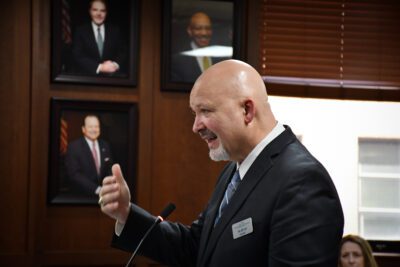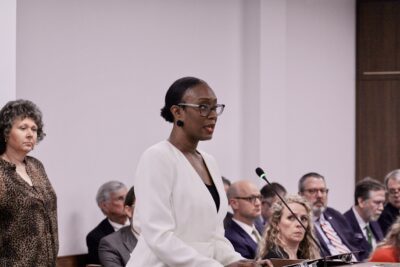
Share this story
|
|
Update: At the time this article was published, SB 692 was heading to the Senate Appropriations Committee. The article was revised to reflect that the bill has now passed the Senate, by a vote of 31-19, and will go before the house. You can find the latest edition of the bill here.
The Senate passed Senate Bill 692, a bill that seeks to overhaul governance of the community college system, on Wednesday after several amendments were filed. One of the major changes rolled back some of the powers the original version vested in the system president.
Monday’s amendment to the bill, originally filed last month, came days after the State Board of Community College named Wilkes Community College President Jeff Cox as the new system head.
“The president of the Community Colleges System needs to be able to run the system,” Todd Johnson, R-Cabarrus, said in an April 10 release. “The State Board will be able to focus on the policy decisions it should make instead of being tied up by tasks best performed by the System President.”
But less than two weeks after Johnson’s statement, he and the bill’s other primary sponsors, Sen. Amy Galey, R-Alamance, and Sen. Tom McInnis, R-Cumberland, made several changes.
“The overall intent of the bill continues to be increasing our capacity for workforce development,” Galey said on Monday. “It continues to be helping our local community colleges be responsive to the needs of employers as they come to North Carolina and seek to have a workforce that’s there and able to address their needs.”
The first amendment makes the election of the community college president subject to approval of the General Assembly, though this provision is not retroactive and will not impact Cox’s election.
The bill prohibits use of state funds for courses of instruction without approval of the State Board of Community Colleges, but the amendment strikes any recommendation from the system president.
The amendment also fixes an issue some community college’s local boards were questioning. The bill provides that the General Assembly appoint eight members of local community college boards and county commissioners appoint another four.
Some community colleges have satellite campuses in neighboring counties. The original bill did not provide for these county commissioners to have a say in appointments, but the amended version would allow these counties to appoint two additional local community college board members.
The amendment removes provisions that would have given the system president authority to make a formal recommendation either approving or denying the local board’s choice for a local college president to the State Board of Community Colleges.
It also removes the bill’s previous intent to give the system president increased budget authority, authority to dismiss a local president, and the opportunity to provide reports to the General Assembly without approval of the State Board.
The Senate rules committee approved the amendments and gave the bill a favorable report.
“I do worry, Mr. Chair, that we’re changing the governance with the community college structure way too quickly without consulting the necessary stakeholder groups,” said Sen. Jay Chaudhuri, D-Wake, who otherwise seemed receptive to a discussion about shifting system governance.
This week, the House unanimously passed HB 601, which calls for a study of community college funding. That bill now goes to the Senate.
The House also passed HB 607, largely along party lines. The bill would prohibit a constituent institution, such as UNC System or community college institution, from compelling students or employees to publicly express a given view of social policy.
The bill would also prohibit constituent institutions from requiring applicants for admission or employment to endorse or describe their actions related to matters of contemporary political debate or social action.
However, the bill does not define the terms “social policy,” “matters of contemporary political debate,” or “social action.” It now also goes to the Senate.





